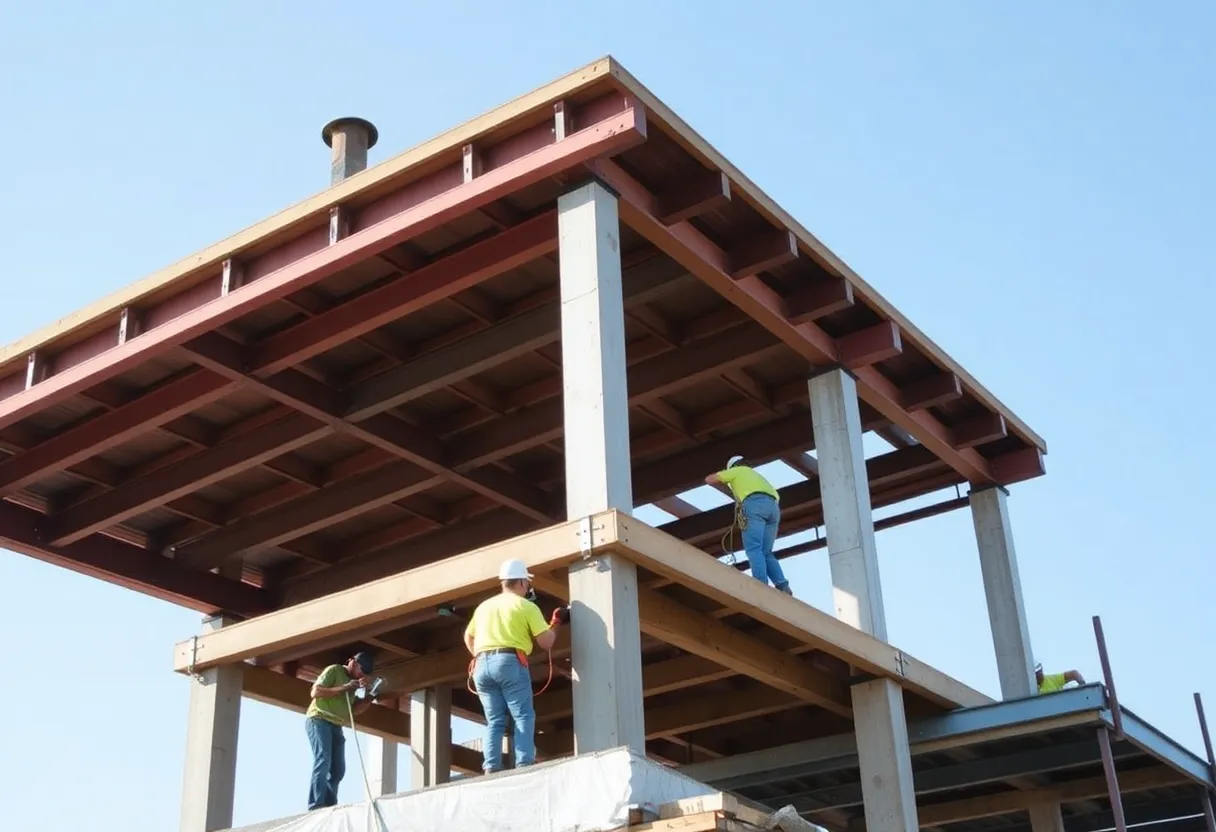Global, September 17, 2025
News Summary
A new market study forecasts strong, sustained growth for construction management software, with revenues rising from roughly USD 7.5 billion to about USD 17.9 billion over the next decade at a projected CAGR near 9.1%. Growth is driven by cloud deployments, AI, BIM coordination, and mobile-first field tools that enable offline sync, photo markups, and geotagged evidence. Commercial construction and project management tools lead demand, while vendors offering stable uptime, intuitive UX, open APIs and robust audit trails are best positioned to win portfolio-wide rollouts and reduce rollout risk for owners and EPC groups.
Construction management software market set to more than double by 2035
The global market for construction management software is poised for strong, sustained growth over the next decade, rising from USD 7.5 billion in 2025 to USD 17.9 billion by 2035 at a projected compound annual growth rate of 9.1%. A recent 250‑page market study released in mid‑September 2025 lays out annual forecasts, adoption drivers, technical trends, and regional outlooks that underpin this expansion.
Year‑by‑year market outlook
The market is expected to climb steadily each year: 2025: USD 7.5B; 2026: 8.2B; 2027: 8.9B; 2028: 9.7B; 2029: 10.6B; 2030: 11.6B; 2031: 12.6B; 2032: 13.8B; 2033: 15.1B; 2034: 16.4B; 2035: 17.9B.
Who is buying and what they want
Cloud deployments dominate early adoption, with cloud platforms expected to hold roughly 61.3% of revenue in 2025. Commercial construction leads building‑type demand, commanding about 57.8% of market share that year. On the applications side, project management and scheduling tools represent the largest single slice at around 34.2% in 2025.
Operational drivers and practical gains
Adoption is being pulled by tangible field and office benefits: mobile consolidation of field reporting, RFI tracking, and issue logs; synchronized plans and photos; and fast, audit‑ready documentation. Reported outcomes include fewer rework events, faster project closeouts, and cleaner handovers — factors that make the yearly growth pattern both credible and resilient.
Integration and controls: what’s becoming standard
Centralizing contract administration, progress billing, and change order controls while integrating with ERP systems, model viewers, and electronic signature tools is improving handover quality and reducing disputes. Decision makers are prioritizing mobile stability, offline capture, robust audit trails, and open APIs that feed estimating, accounting, and enterprise systems.
Who mandates rollouts and how vendors win
Owners and engineering‑procurement‑construction groups increasingly mandate portfolio‑wide rollouts to enforce standard templates and role‑based permissions. Vendors that deliver stable uptime, intuitive user experience, offline synchronization, and open APIs are best positioned to capture share, because well‑organized evidence from day one lowers operational risk and speeds claim resolution.
Market positioning and sector reach
Construction management suites are described as the operational control layer connecting contractors, owners, and EPC firms. Core value is realized through integrated scheduling, cost control, RFIs, submittals, change orders, punch list execution, document control, and issue tracking. Aggregated share estimates place construction management software as a meaningful portion across related software markets (roughly summing to the high‑90s percent when mapped across AEC, PPM, construction tech, BIM, and field service slices).
Technical trends reshaping projects
Rising use of cloud computing, artificial intelligence, BIM coordination, and real‑time analytics is transforming planning, execution, and monitoring. Mobile‑first capture with offline sync, QR/NFC tagging, photo markups, and geotagged evidence is anchoring defects to rooms and assets. Linking BIM model context to issue tracking, quantities, and clash‑driven rework prevention shows strong outcomes where model fidelity informs field decisions.
Regional momentum and growth rates
Growth is uneven by region. Forecast compound annual rates from 2025–2035 highlight faster expansion across parts of Asia and solid increases in Europe and North America: China 12.3%; India 11.4%; Germany 10.5%; United Kingdom 8.6%; United States 7.7%. Asia is expected to lead on volume deployments and localized interfaces.
Challenges and mitigation
Common obstacles include field resistance to process change, spotty jobsite connectivity, per‑seat pricing confusion, legacy system integrations without modern APIs, and extended procurement cycles due to audit and data residency rules. Suggested mitigations include offline‑first design, transparent SKU and pricing packaging, fixed‑scope onboarding, regional support, and publishable implementation playbooks to reduce rollout risk.
Outlook
With global construction activity expected to increase and digital transformation accelerating, the sector is set for sustained software adoption. Investments are being driven by the need to reduce delays, control costs, improve resource allocation, and provide audit‑ready documentation — making integrated, mobile‑capable platforms a core component of modern project delivery.
Frequently Asked Questions
What is the projected size of the construction management software market by 2035?
The market is projected to reach USD 17.9 billion by 2035, up from USD 7.5 billion in 2025.
What growth rate does the market expect?
The forecasted compound annual growth rate from 2025 to 2035 is approximately 9.1%.
Which deployment model leads the market?
Cloud solutions dominate, with an expected revenue share of about 61.3% in 2025. Cloud platforms provide remote access, regular updates, and reduced in‑house IT burden.
Which building type consumes the most software in 2025?
Commercial buildings represent roughly 57.8% of the market in 2025, driven by project complexity, scale, and the need for integrated budgeting, scheduling, and compliance tools.
What application area is largest?
Project management and scheduling is the largest application segment, accounting for about 34.2% of market revenue in 2025.
What are major adoption barriers?
Key barriers include connectivity gaps on jobsites, legacy system integration limits, pricing and procurement complexity, and training or change management needs.
How can organizations reduce rollout risk?
Best practices include choosing platforms with offline functionality and open APIs, using fixed‑scope onboarding, regional support, template libraries, and data migration packages to accelerate user adoption across trades.
Key features at a glance
| Feature | Why it matters | 2025 snapshot / stat |
|---|---|---|
| Market size | Shows scale and investment appetite | USD 7.5 billion |
| 10‑year outlook | Indicates long‑term growth potential | USD 17.9 billion by 2035; 9.1% CAGR |
| Deployment | Cloud lowers IT burden and supports mobility | Cloud 61.3% share |
| Building type | Where demand is concentrated | Commercial 57.8% share |
| Top application | Core tools running projects day‑to‑day | Project management & scheduling 34.2% |
| Regional growth leaders | Where deployments and customization will scale | China 12.3%, India 11.4%, Germany 10.5%, UK 8.6%, US 7.7% |
| Major challenges | Risks to adoption and rollout timelines | Connectivity, legacy integration, pricing, training |
Deeper Dive: News & Info About This Topic
Additional Resources
- Business Wire: United States Construction Industry Report 2025–2034
- Wikipedia: Construction industry
- Statista: Projected value of total U.S. construction
- Google Search: Projected value of total US construction 2025
- Reuters: U.S. offshore wind farm projects
- Google News: US offshore wind farm projects 2025
- JD Supra: Asbestos enforcement — U.S. environmental
- Encyclopedia Britannica: Asbestos
- The New York Times: U.S.–Britain nuclear deal
- Google Scholar: US Britain nuclear deal 2025
Author: Construction FL News
The FLORIDA STAFF WRITER represents the experienced team at constructionflnews.com, your go-to source for actionable local news and information in Florida and beyond. Specializing in "news you can use," we cover essential topics like product reviews for personal and business needs, local business directories, politics, real estate trends, neighborhood insights, and state news affecting the area—with deep expertise drawn from years of dedicated reporting and strong community input, including local press releases and business updates. We deliver top reporting on high-value events such as the Florida Build Expo, major infrastructure projects, and advancements in construction technology showcases. Our coverage extends to key organizations like the Associated Builders and Contractors of Florida and the Florida Home Builders Association, plus leading businesses in construction and legal services that power the local economy such as CMiC Global and Shutts & Bowen LLP. As part of the broader network, including constructioncanews.com, constructionnynews.com, and constructiontxnews.com, we provide comprehensive, credible insights into the dynamic construction landscape across multiple states.





